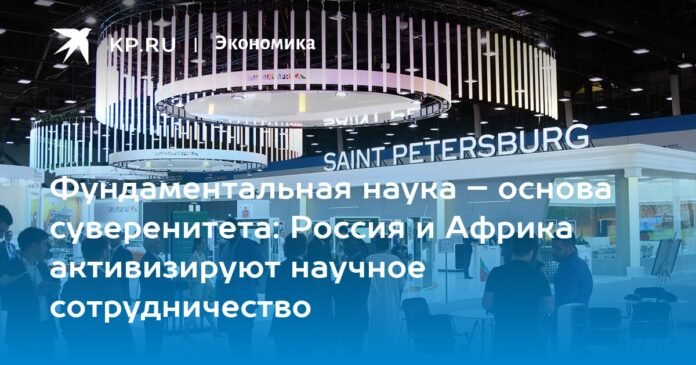Dozens of scientific cooperation agreements signed at the Russia-Africa Summit
Photo: Julia PYKHALOVA
The second Russia-Africa summit that has just been held in St. Petersburg continues to be perceived as an event that contributed to the strengthening of political ties between the Russian Federation and the countries of the African continent. However, the forum program included a wide variety of discussion topics, among which a large number of sessions were devoted to scientific and technical cooperation and its perspectives.
The tone was set by the debate that took place during the round table “Fundamental science as the basis of technological sovereignty”.
Zimbabwe’s Minister of Education, Science, Innovation and Technology, Amon Murvira, immediately emphasized:
– Yes, fundamental science is the basis of sovereignty. But at the same time, science should not be for science’s sake. It is important that fundamental science is translated into specific technological solutions.
The round table participants agreed that science, like art and culture, is a common value for all humanity. And first of all, speaking of the development of science and obtaining new scientific results, it is necessary to think not about the economic advantage of individual countries or industrial consortia, but about the benefits for each person. At the same time, the duty of every scientist should be to contribute to the realization of scientific achievements for the benefit of as many people as possible, especially in those countries where people suffer from hunger, disease and premature death. At the same time, the responsibility of scientists also lies in understanding the consequences of uncontrolled industrial progress and its possible impact on our planet, on the security of humanity. Scientists must take a holistic view of scientific achievement, realizing that scientific and technological progress today may have climate consequences or become a weapon on a planetary scale tomorrow.
Assistant to the President of the Russian Federation Andrey Fursenko said:
– Both higher education and fundamental science are an important part of creating a foundation for development not only of a separate country, but also of humanity as a whole. It is also the transmission of a cultural code from generation to generation. Africa must trust itself, its own history, but it is absolutely shameless to use the knowledge and skills of other countries. It is only necessary that these opinions are not imposed, everything must be voluntary.
Denis Sekirinsky, Deputy Minister of Science and Higher Education of the Russian Federation, agreed with him:
– The fundamental basis of all cooperation is respect and the ability to listen to each other. This is precisely what is lacking in international relations and, in particular, in international scientific cooperation. Both Russia and Africa have priorities, there is room for cooperation in the scientific field. They are also issues related to energy, industrial safety, agriculture, medicine and health. The regulatory framework for such interaction is important: there is a corresponding agreement between the Russian Federation and the African Union, and it defines scientific cooperation as the most important priority. More than 30 African countries have separate agreements with Russia on scientific cooperation, three more were signed at this summit.
The Vice President of the Russian Academy of Sciences, the Vice President of the Kurchatov Institute, Vladislav Panchenko, considered it necessary to add the following:
– To maintain the socioeconomic level of development, it is necessary to determine what to do? That is, determine the demand, and this is the most important element. After all, a person with a higher education diploma may be unemployed. Our institute has a rich experience of cooperation with African countries, where we help carry out certain studies. The results, for example, showed that in South Africa they are very interested in the development of nuclear energy and astronomy, in Egypt – in fundamental mathematics.
Director of the Scientific Center of Neurology, Vice President of the Academy of Sciences of the Russian Federation Mikhail Piradov paid special attention to medicine:
– What do almost all people on Earth want? Maybe so that they are healthy, that their loved ones feel good, that everyone can live many years, happy and intellectually secure. By the way, in the last ten years, of the 18 million scientific articles published in peer-reviewed journals, one in three was devoted to clinical medicine. And two-thirds of these profile articles are in the brain sciences. In the countries of the Old and New Worlds, the structure of mortality differs from that of Africa: in Europe and the Americas, people die more frequently from cardiovascular diseases, oncology and injuries, but in Africa, infectious diseases rank first. place. . Therefore, it is extremely important to work on reducing mortality from infectious diseases. And we can coordinate our efforts in such a way that this or that pathology is defeated.
A peculiar result, which became something of an open appeal, was summed up by the vice president of the Association of Professionals of the Geological Industry of Mali, Hadi Lee:
– In Mali, there is not a single square kilometer of territory that a Soviet geologist would not step on. It was Soviet geologists who made an inventory of all the geological resources of our country, our students studied in the USSR. Today we are the third in Africa in terms of gold production, but we do not have a single specialized Russian company. More precisely, Russia once registered a gold mining corporation, but it was later sold to the British. The Russian Federation discovered limestone deposits in Mali, built a huge cement plant, but all this is now not in the best condition. After all, our cadres were trained in the USSR and Russia. This is a talent shaped by Russia! We need to resume technical and scientific cooperation. We want the Russians back. And politicians, businessmen and scientists.
READ ALSO
Russia will help Africa out of “energy poverty”
New prospects for energy cooperation were discussed in a panel session at the Russia-Africa forum (details)

